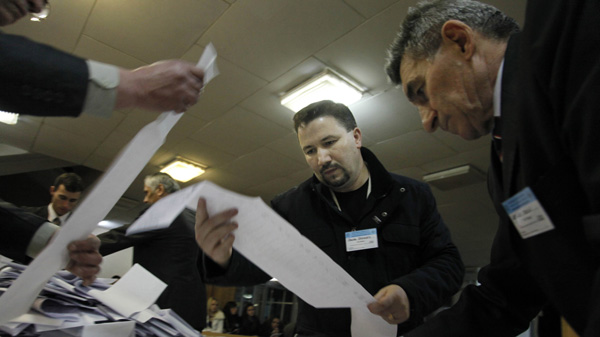
Communists Win Solid Plurality in Moldova’s Elections Again
Publication: Eurasia Daily Monitor Volume: 7 Issue: 212
By:

Moldova’s Communist Party has won yet again a solid plurality in the parliamentary elections held on November 28. The party chairman, former head of state (2001-2009) Vladimir Voronin led the campaign this time from the opposition, against heavy odds. With all in-country votes counted by midday on November 29, the communists took a distant first place at 40.5 percent of the votes cast, and 44 seats in the 101-seat parliament.
The three parties in the governing Alliance for European Integration (AEI) have scored poorly, despite the administrative resources at their disposal during the campaign. The Liberal-Democrat Party, led by Prime Minister Vlad Filat, has obtained 28.5 percent of the votes cast and 31 parliamentary seats, out of 101; the Democratic Party, led by AEI’s presidential aspirant Marian Lupu, 13 percent of the vote and 15 seats; and the Liberal Party led by acting head of state Mihai Ghimpu, 9 percent and 11 seats. The other parties fell below the 4 percent threshold. Late counting of some of the votes from Moldovans abroad might help tweak these figures at the margins, but not change the picture (Central Electoral Commission press release, November 29).
This is the sixth consecutive parliamentary election in which Moldova’s Communist Party obtained solid pluralities or outright majorities (1998, 2001, 2005, April 2009, July 2009, November 2010). To this series may be added the September 2010 constitutional referendum, in which the Communist Party’s boycott call inflicted a humiliating defeat on the governing parties. Outlawed in 1991 and reinstated in 1994, the Communist Party took a distant first place while opposing the incumbent governments in 1998, 2001, July 2009, and again in 2010. The communists won in 2005 and April 2009 as a governing party (“Ten Reasons Why the Communists Keep Winning Elections in Moldova,” EDM, April 7, 2009).
In contrast to its Western-oriented platform of 2005, the Communist Party campaigned this time with a message of equidistance between the West and Russia. The communists had already diluted their pro-European stance during the two election campaigns of 2009. The party’s one-man doctrinal and organizational engine, Mark Tkachuk, shaped the campaign his intensely polarizing style: maximum mobilization of the party’s own base while writing off the moderate voters.
The communists’ grass-roots campaigning offset the government’s incumbency advantage during this electoral campaign. Door-to-door outreach has always been a hallmark of the Communist Party’s campaign style, even when the party was shaping most television coverage while in power. Since 2009, however, the communists lost control of public television, and the party’s own media holding has partly atrophied after the loss of power.
The AEI parties, particularly Filat’s center-right Liberal-Democrats, did accumulate administrative resources and political clienteles during more than one year in government. This interval, however, proved too short for Filat’s party, or the AEI collectively, to consolidate power and establish durable influence networks throughout the country.
Lupu’s center-left Democratic Party adopted a two-vector stance between the West and Russia in this campaign, not unlike the communists, though less crudely than these. But Lupu’s calculations in this regard stemmed from short-term tactics, not values. He hoped to make inroads into the soft periphery of the communist electorate, and sought Moscow’s symbolic endorsement of his presidential aspirations. Ghimpu’s right-wing Liberal Party remains limited to the 10 percent segment of the electorate that harbors strongly pro-Romanian views (“unionist”). This party has smoothly inherited this segment from the formerly “unionist,” now post-nationalist Christian Democrat People’s Party led by Iurie Rosca. The Christian-Democrats’ loss is a loss to Moldova’s political system.
The new parliament will have to elect a state president in this parliamentary republic. The AEI’s total of 55 seats is six short of the 61 necessary under the constitution for electing the head of state. The AEI can form a coalition government, for which 52 (rather than 51) seats are necessary. However, failure to elect the state president would automatically trigger the new parliament’s dissolution and fresh elections, under the constitutional mechanism that operated in the same way twice in 2009. This has thrown Moldova into the convulsions of two-year electoral campaigning under unstable authorities.
Hypothetically, the Communist Party can create a coalition with Lupu’s left-of-center Democratic Party, and form the government with their combined 59 parliamentary seats. This number, however, would still be insufficient for electing the state president and avoiding the parliament’s dissolution. Furthermore, several of the Democratic Party’s deputies would defect, if the party abandons the AEI. The Kremlin has encouraged the formation of a coalition of the Communist and Democratic Parties. Conversely, the European Union and the United States seek to preserve the AEI government, and were hoping to isolate the communists.
If the AEI wishes to continue governing and avoid new parliamentary elections, it will have to make a deal with the Communist Party. Such a deal would include, at a minimum, the nomination and election of a head of state in consensus with the communists; consultations with the Communist Party over the government’s program (which is subject to parliamentary approval); and high posts for the communists in the new parliament. Voronin has hinted repeatedly during the campaign that he could be the new parliament’s chairman. Under the constitution, Voronin is also eligible to become head of state again; but the newly elected parliament’s arithmetic precludes that possibility.
Pre-election opinion surveys had projected considerably lower scores for the communists, and higher ones for the AEI parties, than turned out to be the case on election day (Moldpres, November 22–27). The discrepancy is partly attributable to voters who state a “politically correct,” non-communist preference when asked by pollsters, but vote communist in the secret ballot on election day.




